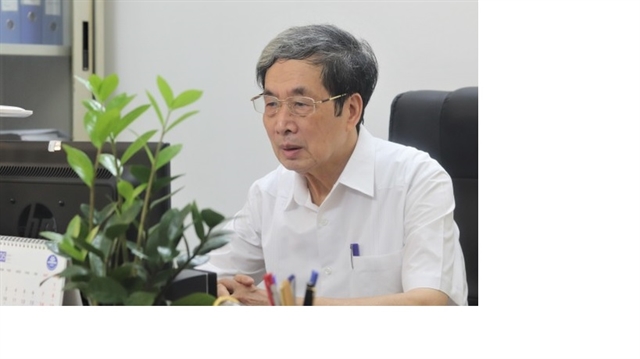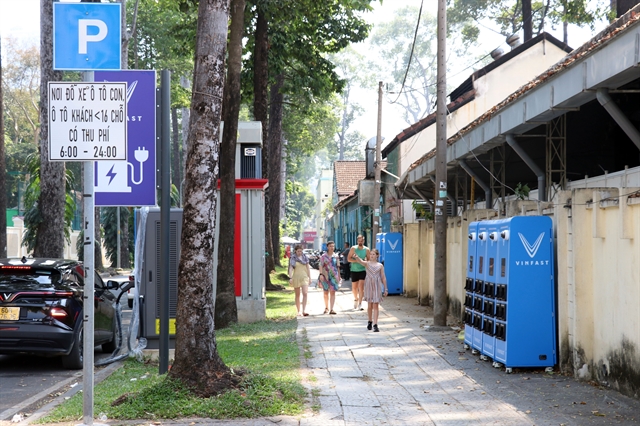.jfif) Opinion
Opinion


|
| Associate Professor Nghiêm Đình Vỹ |
Associate Professor Nghiêm Đình Vỹ, a member of the Development Board of the High School History Curriculum for the 2018 high school education programme, speaks with Giáo dục Việt Nam (Việt Nam Education) magazine about the changes made to the high school curriculum.
Would you walk us through the process of making changes and adjustments to the high school history curriculum?
The history curriculum development board agreed that the 2018 high school history curriculum was compiled very carefully and seriously in terms of quality.
On July 19, the Ministry of Education and Training held a workshop to comment on the adjusted high school history curriculum as required in Resolution No 63/2022/QH15 of the National Assembly.
At the workshop, we proposed an adjustment plan without changing the issued programme structure; proposed reducing a few topics; and adjusted some content in nine topics and left 10 topics unchanged. The editing of the content, concepts and requirements to be achieved in 10th, 11th, and 12th grades is quite specific with the percentage of the time for each content.
The adjustment does not affect or require any modification to the secondary-level history curriculum. Content that has been thoroughly studied at the lower secondary level will be reduced at the high school level. Moreover, the history programme at the secondary level continues to be considered a foundation for students to develop core general knowledge.
In high school, students will study more general and advanced topics. The Programme Development Board only performs the main task of adjusting the content of the existing history programme from 70 sessions to 52 sessions for each grade.
What principles are the programme adjustments based on?
The required adjustments to the history curriculum must be based on the eight key principles that we discussed and outlined.
Firstly, it must comply with the objectives and viewpoints on curriculum development of the 2018 General Education Programme and the characteristics of the History subject.
Secondly, it must be made without changing the current programme structure, strengthening general knowledge at the basic education stage, helping students understand more deeply core knowledge through topics to develop qualities and competencies of a learner.
Thirdly, we have to streamline content and required levels to suit the mass of students.
Fourthly, the new programme has to ensure the fundamentality and system for mass education; at the same time, focusing on career-oriented education for high school students.
Fifthly, the selected topics and contents must be suitable to the psychological characteristics of the age and perception of high school students.
Sixthly, the curriculum has to attach importance to the knowledge of national history and Vietnamese revolutionary history to improve education on patriotism for the country, national pride, historical traditions and national culture. At the same time, it must ensure the connection and harmony between knowledge of world history and Southeast Asian history, ensuring the content of world and regional history knowledge is the basis for a deeper understanding of the nation's history.
Seventhly, the compulsory section of the history programme must be feasible and suitable for all students.
Eighthly, it also pays attention to the harmony, logic, and connection between the content of compulsory history topics (basic and core) with professional-oriented topics of an in-depth nature.
Will the reduction in the number of sessions cause any disturbance for students and teachers?
The adjustment of the compulsory part of the history programme with the high school level has tried to reduce academic knowledge, ensuring the basicity to educate students to love the homeland, the country, and the revolutionary tradition. It will not break the structure of the programme and still contributes to career orientation.
The adjustment of the history programme is not building a brand new one, but is an adjustment between the mandatory and optional parts, mainly changing from 70 sessions to 52 sessions to ensure scientific and pedagogical properties.
We think that 52 sessions are suitable for all students. As for the students who are oriented to study Social and Humanities, in addition to 52 periods, they will learn 35 more specialised lessons.
We will continue with workshops in Hồ Chí Minh City to consult scientists and teachers from the southern provinces. The high school History Programme Development Board in the 2018 General Education Programme will study and make the most appropriate adjustments based on absorbing comments from experts, administrators and teachers.
How should schools and teachers change to meet the requirements of the adjusted programme?
It should be said that in recent years, teachers at all levels have always tried to innovate teaching methods and make changes in assessment tests to make history teaching better.
We ask that teachers consider the adjusted programme as an obligation and textbooks as the leading reference in teaching. Teachers can study many sets of textbooks, as long as they stick to the requirements to prepare quality lesson plans.
The role of teachers is not only as an attractive imparter of knowledge but also as an organiser and operator of teaching hours for the sake of students’ capacity development. Teachers need to be equipped with and effectively use teaching equipment by the school and refer to standard documents on the Internet and many other materials. Of course, teachers must also be good at running extracurricular activities.
For the part of management agencies, it is necessary to create favourable conditions for teachers to innovate and have more motivation for teaching the subject. VNS




